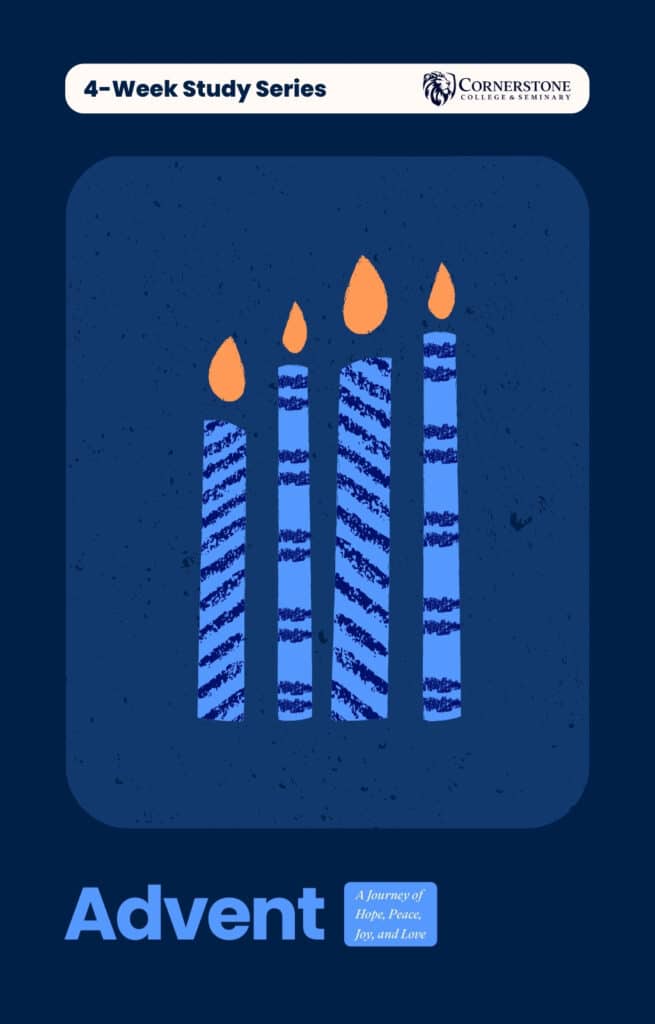A 4-Week Journey: Hope, Peace, Joy, and Love
Advent, a season observed by many Christians worldwide, invites us into a period of reflection and anticipation. It’s not just about counting the days to Christmas but about preparing our hearts and minds to celebrate the profound gift of Christ’s birth. This four-week journey of Advent centers on four key themes: Hope, Peace, Joy, and Love. Each theme encapsulates core aspects of the Christian faith, serving as both a reminder of Christ’s first coming and a hopeful anticipation of His return.
So let’s walk through these four themes, exploring their significance and how we can live them out during the Advent season.
Scripture Focus: Isaiah 9:1-7 and Luke 1:26-38
Key Theme: Anticipation and Hope
Advent begins with hope—a theme that is both universal and deeply personal. Hope is the lifeblood of the Christian faith, a thread that weaves through the entire biblical narrative, from Genesis to Revelation. The prophets of the Old Testament, especially Isaiah, foretold the coming of the Messiah as a beacon of hope to a weary and oppressed Israel. Isaiah 9:1-7 speaks of a child who will reign as the Prince of Peace, providing light to those walking in darkness.
In the New Testament, the angel Gabriel’s announcement to Mary in Luke 1:26-38 reveals the fulfillment of this long-awaited hope. Mary’s acceptance of her role in God’s plan illustrates the confident expectation and trust that defines biblical hope. Unlike worldly hope, which may waver based on circumstances, biblical hope is anchored in God’s unchanging character and His faithfulness to His promises.
Application: Living in Hope
During Advent, we are reminded that hope is not only about looking back at Christ’s first coming but also about anticipating His return. This is a season to reflect on how we live in hope, even in the midst of life’s challenges. Just as Israel waited for the Messiah, we wait in hopeful anticipation of God’s continued work in our lives and the world.
Scripture Focus: Luke 2:8-14 and John 14:27
Key Theme: The Peace Christ Brings
Peace is one of the most profound gifts of Advent. The angels who appeared to the shepherds on the night of Christ’s birth proclaimed “peace on earth,” signaling that the Prince of Peace had arrived (Luke 2:14). But this peace is far more than the absence of conflict. It is a deep sense of wholeness and reconciliation—first with God, and then with others.
Biblical peace, or *shalom*, encompasses all areas of life, including our relationship with creation, with one another, and within ourselves. In John 14:27, Jesus offers His disciples a peace that the world cannot give. This peace transcends circumstances, guarding our hearts even in the face of turmoil or uncertainty.
Application: Living in Peace
Advent invites us to reflect on how we can cultivate peace in our hearts, homes, and communities. In a season often marked by busyness and stress, we are called to slow down and embrace the peace that only Christ can bring. How do we embody that peace? Through acts of reconciliation, forgiveness, and kindness. As followers of Christ, we are called to be peacemakers in a world longing for restoration.
Scripture Focus: Luke 1:39-56 and Philippians 4:4-7
Key Theme: The Joy of Christ’s Presence
The third Sunday of Advent is marked by joy. Christian joy, however, is not merely an emotional response to circumstances but is deeply rooted in the presence of God. This joy is seen in Mary’s visit to Elizabeth, where both women rejoice over the fulfillment of God’s promises. Mary’s song, the Magnificat (Luke 1:46-55), is a powerful expression of her joy in God’s faithfulness.
Paul, writing from prison in Philippians 4:4-7, encourages believers to “rejoice in the Lord always.” This joy is not dependent on external situations but is anchored in the knowledge of God’s goodness and grace. It is a joy that remains steady, even in the midst of hardship.
Application: Focusing on Joy During Advent
As we prepare for Christmas, how do we cultivate joy in our lives? One practical way is through gratitude. By focusing on God’s blessings, we shift our perspective from what we lack to what we have been given. Joy is also found in acts of worship and service. As we share the joy of Christ with others—whether through kind words, acts of service, or simply being present—we experience the fullness of this gift.
Scripture Focus: John 3:16-17 and 1 John 4:7-12
Key Theme: The Ultimate Expression of God’s Love
Advent culminates in love—the ultimate reason for Christ’s coming. John 3:16 reminds us that God’s love for the world was so great that He gave His only Son so that we might have eternal life. This is the essence of the Christmas story: a God who loves us so deeply that He entered into our brokenness to redeem and restore.
1 John 4:7-12 extends this message by calling us to love one another as God has loved us. Advent is a time not only to reflect on God’s love but to put that love into action. Whether through acts of kindness, generosity, or simply being present for those in need, we are called to be vessels of God’s love.
Application: Showing Christlike Love During Advent
How can we embody Christ’s love this Advent season? One way is by reaching out to those who may be struggling, whether through practical help or simply offering encouragement. We are also called to forgive and reconcile with those who have wronged us. In doing so, we reflect the unconditional, sacrificial love of Christ.
Living the Advent Journey
The journey of Advent is not just a seasonal reflection but a lifelong practice of embodying hope, peace, joy, and love. As we move through each week, we are reminded that the birth of Christ changes everything. It brings hope to the hopeless, peace to the troubled, joy to the sorrowful, and love to the brokenhearted.
As we celebrate the birth of Jesus, may the themes of Advent transform our hearts and lives. Let us live out this journey not just during Advent but throughout the year, as we anticipate the fullness of God’s kingdom and His eternal promises.
May the hope, peace, joy, and love of Advent fill your heart and home this season and always.
This article was written by CCS staff with generative assistance from AI.

Claim Your Free Advent Ebook & Curriculum Guide
Get notified about new resources





At Cornerstone, I am able to take courses at cheaper tuition rates than other colleges. Plus, the professors are very friendly and every class feels personal.
Daniel Gowaty CCS Student